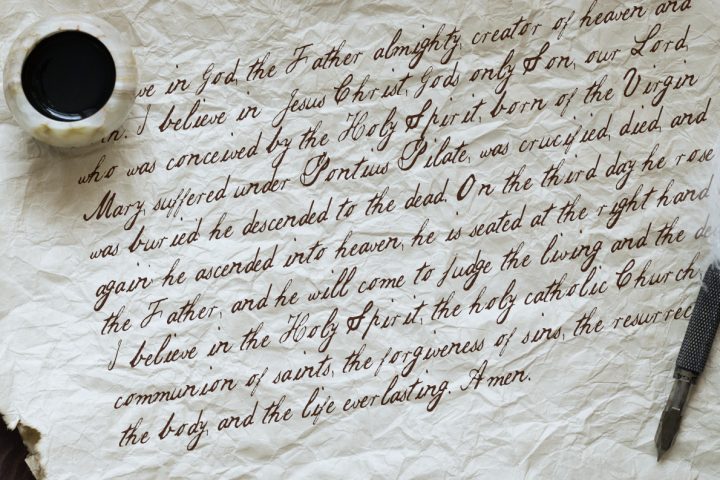'creed' Tagged Posts
Not Just a Label: What Four Specific Words Mean in My Statement of Faith
I believe in historical, evangelical, reformed, and Biblical Christianity. – Scott Roberts, on my Statement of Faith page” When I wrote the summary sentence in my Statement of Faith on my website, I realized that a short list of doctrinal points, while helpful, does not always communicate the full picture of what a person means. Words carry weight. Labels carry history. Over time, I have come to understand that when someone says they are a “Christian,” that statement alone can…
Should Christians Keep the Saturday Sabbath? A Bible-First, History-Honest Case
Why Christians no longer keep the Old Covenant Sabbath – and how the Lord’s Day honors the risen Christ. If you love Jesus, you love His Word. You also want to obey what He actually commands under the New Covenant. The weekly seventh-day Sabbath was a covenant sign given to Israel, fulfilled in Christ, and not imposed on Gentile believers. The apostolic church gathered on the first day in celebration of the resurrection, without binding consciences to a Saturday rest…
What Jesus’ Death and Resurrection Accomplished
Whenever I reflect on the cross and the empty tomb, I’m struck by how vast and comprehensive the work of Christ truly is. The Death and Resurrection of Jesus are not only the emotional centerpiece of the whole biblical story, but they are the theological foundation upon which the entire Christian faith rests (1 Corinthians 15:3-4). Every soteriological doctrine of redemption, reconciliation, and restoration finds its fulfillment in those two historical events. Christ’s death was not a tragic accident of…
The Nashville Statement
The Nashville Statement, first published online on August 29, 2017, was crafted by the Council on Biblical Manhood and Womanhood (CBMW) in Nashville, Tennessee. This document is an evangelical Christian declaration concerning human sexuality and gender roles. It advocates for traditional marriage between one man and one woman, emphasizes fidelity within marriage, promotes chastity outside of marriage, and underscores the connection between biological sex and one’s identity as male or female. Additionally, the Statement expresses opposition to LGBT sexuality, same-sex…
The Danvers Statement
The Danvers Statement delineates the complementarian Christian perspective on gender roles. It isn’t tied to any specific Christian denomination but has garnered recognition from institutions like the Southwestern Baptist Seminary, the Presbyterian Church in America, and the International Council for Gender Studies. Initially unveiled by the Council on Biblical Manhood and Womanhood (CBMW) in Wheaton, Illinois, it traces its origins to discussions among “several evangelical leaders” at a CBMW gathering in Danvers, Massachusetts, in December 1987. The Danvers Statement Rationale…
Fellowship of Evangelical Baptists (FEB) Belief Statement/Affirmation of Faith
I would be remiss if I didn’t include the Statement of Faith of the association that my church is a part of, the Fellowship of Evangelical Baptists (FEB or The Fellowship) in Canada. The core of FEB and the reason for our national unity, is our commitment to a set of shared beliefs. The following Belief Statement, or Affirmation of Faith, is a declaration of the truths that unite the organization in ministry. As believers in the Lord Jesus Christ, FEB…
Baptist Faith and Message of the Southern Baptist Convention
The Baptist Faith and Message (BF&M) is the statement of faith of the Southern Baptist Convention (SBC). The original statement was ratified in 1925, with revisions and amendments made in 1963, 1998, and 2000. Baptist Faith and Message of the Southern Baptist Convention I. The Scriptures The Holy Bible was written by men divinely inspired and is God’s revelation of Himself to man. It is a perfect treasure of divine instruction. It has God for its author, salvation for its end,…
New Hampshire Baptist Confession of 1833
This is the New Hampshire Baptist Confession. According to BibleHub.com, this Confession was drawn up by the Rev. John Newton Brown, D.D., of New Hampshire (1803-1868), about 1833, and has been adopted by the New Hampshire Convention, and widely accepted by Baptists, especially in the Northern and Western States, as a clear and concise statement of their faith, in harmony with the doctrines of older confessions, but expressed in a milder form. New Hampshire Baptist Confession of 1833 Declaration of…
Chicago Statement on Biblical Inerrancy
This is the Chicago Statement on Biblical Inerrancy (1978). In October of 1978, over 200 evangelical pastors, theologians, and leaders of many different denominational backgrounds came together to make a unified statement for the infallibility and inerrancy of the Bible to safeguard against liberal attacks and beliefs. Not only are there affirmation statements (“We affirm…”) but denial statements as well (“We deny…”) to counter contrary positions. The Chicago Statement on Biblical Inerrancy Preface The authority of Scripture is a key…
The Thirty-Nine Articles of Religion
These are the Thirty-Nine Articles of Religion of the Church of England, which began with the Ten Articles in 1536, and finalized with the full Thirty-nine articles in 1571. The Thirty-Nine Articles of Religion THE ARTICLES OF RELIGION Agreed upon by the Archbishops, Bishops, and the whole clergy of the Provinces of Canterbury and York, London, 1562. I. Of Faith in the Holy Trinity There is but one living and true God, everlasting, without body, parts, or passions; of infinite…
The Athanasian Creed
This is the Athanasian Creed, which is one of the four authoritative creeds of the Roman Catholic Church/Early Christian Church. Sometimes known as Quicunque Vult or Quicumque Vult (for the opening two words of it in Latin). This creed is named after Athanasius (AD 293-373), the champion of orthodoxy against Arian attacks on the doctrine of the Trinity. It was developed in the Fifth Century AD. The Athanasian Creed 1. WHOSOEVER would be saved / needeth before all things to…
1689 London Baptist Confession of Faith
This is the 1689 London Baptist Confession of Faith. Also known as the Second London Baptist Confession or just The Confession of Faith, this was written by an English Reformed/Calvinistic group of Baptists called the Particular Baptists and first published in 1677, and later republished in 1688 and 1689. The following is a Modern English rendition of the original Old English text, translated by Michael Cheng of Grace Family Baptist Church in Houston, Texas. Visit his translation page here. 1689 London…
The Chalcedonian Creed
This is the Chalcedonian Creed (sometimes referred to as the Chalcedonian Definition or the Definition of Chalcedon) and agreed upon in AD 451. The Chalcedonian Creed We, then, following the holy Fathers, all with one consent, teach men to confess one and the same Son, our Lord Jesus Christ, the same perfect in Godhead and also perfect in manhood; truly God and truly man, of a reasonable soul and body; consubstantial with the Father according to the Godhead, and consubstantial…
The Nicene Creed
This is the Nicene Creed (AD 325; Revised at Constantinople in AD 381): The Nicene Creed I believe in one God the Father Almighty; Maker of heaven and earth, and of all things visible and invisible. And in one Lord Jesus Christ, the only-begotten Son of God, begotten of the Father before all worlds, God of God, Light of Light, very God of very God, begotten, not made, being of one substance with the Father; by whom all things were…
Westminster Confession of Faith
To read other Christian creeds and confessions, go here. Westminster Confession of Faith This is the Westminster Confession of Faith (1643–46) [Text of the American Version]. This creed was created from 1643 through 1646 by the Westminster Assembly as part of the Westminster Standards to be used as a confession of the Church of England. For the Church of Scotland, it became and remains the “subordinate standard” of doctrine, and it continues to be influential within Presbyterian churches all around…
The Apostles’ Creed
This is the Apostles’ Creed, which some believe to have come to form around 125-250 AD, and totally solidified by the Third or Fourth Century A.D.: The Apostles’ Creed I believe in God the Father Almighty; Maker of heaven and earth. And in Jesus Christ his only Son our Lord; who was conceived by the Holy Ghost [Spirit1], born of the virgin Mary; suffered under Pontius Pilate, was crucified, dead and buried; [he descended into hell;2] the third day he…




